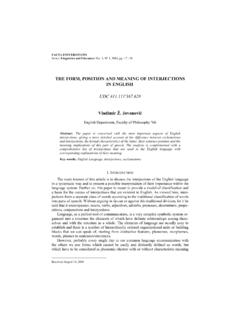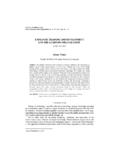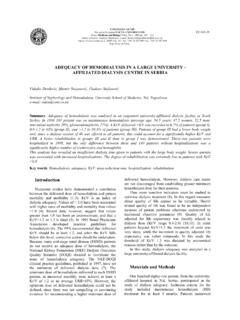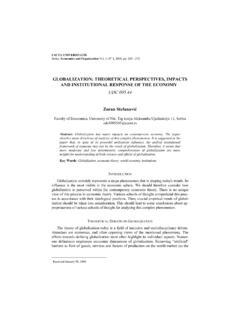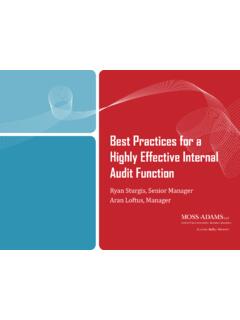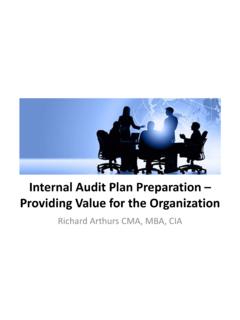Transcription of CONTROLLING – A MODERN SYSTEM OF MANAGEMENT …
1 FACTA UNIVERSITATIS. Series: Economics and Organization Vol. 7, No 2, 2010, pp. 253 - 262. CONTROLLING A MODERN SYSTEM OF MANAGEMENT AND. CONTROL . UDC Oleg Dimov, Plamen Iliev Financial Control Department, University of National and World Economy, Sofia, Bulgaria Abstract. This article tries to clarify the essence of CONTROLLING as a concept and the way of implementation and place of application thereof. CONTROLLING is a concept concerning the MANAGEMENT of a given SYSTEM , enterprise included, and as such it receives a high recognition in practice, both in the at the begging of the 20th c. and in Europe during the second half of the last century. It is widely popular in Germany where it was first introduced from the and where huge efforts are being mage to develop and implement the same. At the end of the 20th and the begging of the 21st c. CONTROLLING finds wide application both in Russia and in the Eastern-European countries.
2 The aim is most clear with the help of the CONTROLLING to try to catch up with leading countries in market economy, MANAGEMENT and control, including in the time of crisis. Key Words: CONTROLLING , MANAGEMENT , planning, accounting , strategy, control EXPOSE. The word ' CONTROLLING ' derives from the English verb 'to control' to run, to manage. It is the MANAGEMENT accounting that constitutes the basis of CONTROLLING . The concept of CONTROLLING was developed in the 70s of the 20th century as a vehicle designed to pre- vent crisis situations leading companies to bankruptcy1. A key principle of this concept, also referred to as ' MANAGEMENT according to deviations', is the operational comparison of the main planned /normative/ and factual indicators with the purpose of outlining the de- viations between them. CONTROLLING represents a group of methods for operational and strategic MANAGEMENT : registration, planning, analysis and control, which are combined on a qualitatively new.
3 Received May 4, 2010. 1. 'Planning and Control the Concept of CONTROLLING ' D. Han 1997. 254 O. DIMOV, P. ILIEV. stage of the development of market relations into a unified SYSTEM , the functioning of which is subordinated to a particular CONTROLLING is an instrument for planning, accounting , analysis and control of the status of the operations within an enterprise; it is used for decision-making on the basis of a SYSTEM for data collection and processing, which is a SYSTEM of constant assessment from different points of company's business, of company's branches, managers and em- ployees, and which comprises accounting , analysis and control as an integrated This requires: increase of the level of knowledge of the specialists within the organization and activation of their intuitive and logical awareness, which will promote flexibility of the MANAGEMENT SYSTEM and attain the objectives of the company at the same time.
4 Formation of a CONTROLLING SYSTEM which is to become the basis for the timely im- provement of the informational and methodical support of company's MANAGEMENT and to minimize the probability of an occurrence of collapses between the needs of the environment and opportunities of the enterprise to satisfy the same;. creation of instruments in the field of prognostication of the efficiency of the interaction of the CONTROLLING and the MANAGEMENT within the organization, of the choice of the rational direction of their development and the analysis of the pro- duction processes and realization of the produce of the enterprise. CONTROLLING as a complicated and versatile category cannot be fully realized without the related methodological basis. Whenever starting research in a particular field, we are to have a clear idea of what CONTROLLING means, characterize the terms ' CONTROLLING sys- tem', 'instruments of CONTROLLING ', 'functions of CONTROLLING ', as well as formulate and sys- tematize the main principles and requirements for its implementation into the MANAGEMENT structure of the organization.
5 Scholarly literature proposes a number of different definitions of CONTROLLING , which differ mainly because of the research approaches used. First, CONTROLLING used to be conceived as and aggregate of tasks solved in the field of reporting and finance , and the controller was the accountant general. Later on, the term was given a broader sense. Financial control and optimization of the funds and sources used for attainment of the overall objectives and the results from the business operations, including the amount of taxes was supplemented to the CONTROLLING functions4 /in eco- nomic sense CONTROLLING is a profit MANAGEMENT SYSTEM /. The development of CONTROLLING and its implementation within organizations was, to a great extent, influenced by the economic crises. The years of depression led to the aware- ness that successful MANAGEMENT is strongly related to inter-company planning.
6 This, on its turn, led to evolution of the views of CONTROLLING : from the historical accounting view in the understanding of CONTROLLING and its functions as oriented to future events. Currently, CONTROLLING is а functionally individuated field of the economic operations of the enterprise, which is related to realization of the financial, economic and CONTROLLING function within the MANAGEMENT for taking operative and strategic managerial decisions. 2. ' CONTROLLING for Managers and Specialists' Falko Moscow 2008. 3. ' CONTROLLING ' Karminskyi , Falko Moscow 2006;. 4. ' CONTROLLING for Beginners' R. Man, E. Mayer Moscow 1992. CONTROLLING a MODERN SYSTEM of MANAGEMENT and Control 255. This can be explained by the means of the well known 'comparison of the controller with the pilot'. Let us imagine that the company is the navy pursuing the objective following a set course.
7 The navy has an admiral. He is the master of the company. Furthermore, navy comprises ships they are the functional areas of company's activity: production, mar- keting, purchase, finance , etc. Ships are headed by captains, in our case head of produc- tion, financial director, HR manager, marketing director, etc. All of them, along with the admiral, are the navy top MANAGEMENT . Furthermore, the navy has its pilot or navigation officer this is the economic adviser, the controller, whose duties are to timely predict the shallows on the course and, based on the information available, suggest to the navy MANAGEMENT the probability of an the risk for the ships to get stranded, the seriousness of the consequences of such event, etc. The navy MANAGEMENT should unconditionally pay attention to the recommendations of the navigation officer and assess all pros and cons prior to taking a decision: to change the course or to proceed straightforward notwithstanding the circumstances, following the principle 'let's wish to go through'.
8 The decision is always with the MANAGEMENT . The ad- miral and the captains are liable for their decisions, especially if they have ignored the warnings of the navigation officer5. Therefore, controller should not be identified with the manager since the navigation officer never stands behind the wheel but is responsible for the ship to reach the harbor. Main objective of CONTROLLING is to orientate the MANAGEMENT process towards attain- ment of the objectives set by the company managers6. For this purpose, CONTROLLING em- ploys a set of instruments, : Benchmarking /analysis of and comparison with the competitors/. Scenario analysis /design of development scenarios/. Value analysis, etc. The issues pertaining to the organization of CONTROLLING are to be settled individually for each company, taking into consideration the specificity of its operations. However, when it comes to the most general requirements and approaches known nowadays, the following key ones can be outlined: 1.
9 Establishment of an own CONTROLLING division. This variant has the following advantages: Company employees are familiar with the internal organization of the company and branch specificities of the business;. Habits and experience gained remain in the company;. Company MANAGEMENT can use the division as a 'ground' for professional growth and career development of the future MANAGEMENT staff;. 2. Involvement of outsourcing implementation of all or some of the functions re- lated to the corporate MANAGEMENT by external specialists, CONTROLLING functions to be wholly or partially assigned to a specialized company or external consultant. 3. Co-sourcing this means the establishment of CONTROLLING bodies within the com- pany, and, in some cases, involvement of experts from specialized companies or external consultant to be involved. 5. ' Business CONTROLLING ' Popchenko, Ermasova 2006.
10 6. ' CONTROLLING as a Company MANAGEMENT Instrument' Anankina, Donilochkin 2002. 256 O. DIMOV, P. ILIEV. However, in experts' opinion, it is not advisable for each enterprise to establish its own CONTROLLING division. Potential benefits from the outsourcing and co-sourcing approach include: The opportunity to use the services of experts from various fields;. Access to highly qualified MANAGEMENT staff;. Flexibility in respect to attraction of resources /for instance, in case of implementa- tion of a new SYSTEM the staff of the managers will not be required to be increased or resources to be transferred from the implementation of other projects/;. Access to leading technologies and profit MANAGEMENT methods. Various organizations prefer to approach outsourcing and co-sourcing. These organi- zations are both small and medium-sized enterprises, which have not enough funds avail- able to establish their own division, and some big companies.



